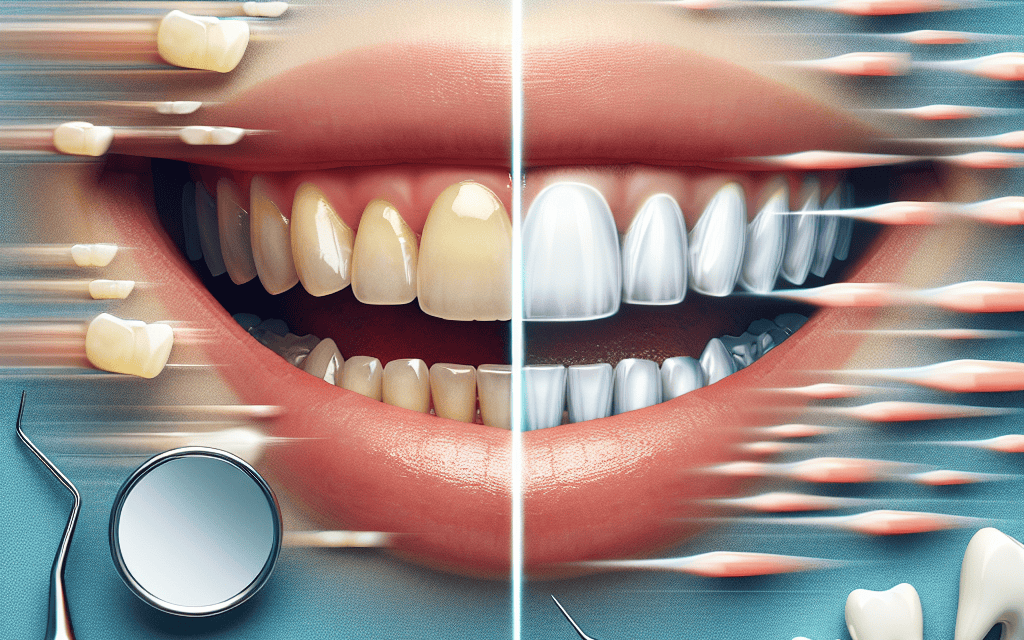Veneers: Your Quick Path to Perfectly Aligned Teeth
In the quest for a perfect smile, many individuals are turning to dental veneers as a solution for misaligned, discolored, or damaged teeth. Veneers are thin shells of porcelain or composite resin that are custom-made to fit over the front surface of teeth, providing an instant transformation. This article delves into the world of veneers, exploring their benefits, the procedure involved, maintenance tips, potential drawbacks, and real-life success stories. By the end, you will have a comprehensive understanding of how veneers can be your quick path to perfectly aligned teeth.
Understanding Dental Veneers
Dental veneers are a popular cosmetic dentistry option that can dramatically improve the appearance of your smile. They are designed to cover imperfections in teeth, such as chips, gaps, and discoloration. Veneers can be made from two primary materials: porcelain and composite resin. Each material has its unique properties, advantages, and disadvantages.
Types of Veneers
There are two main types of veneers: porcelain veneers and composite resin veneers. Understanding the differences between these two options is crucial for making an informed decision.
- Porcelain Veneers: These are made from high-quality ceramic material that mimics the natural appearance of teeth. Porcelain veneers are known for their durability and resistance to staining. They are custom-made in a dental laboratory and require at least two visits to the dentist for placement.
- Composite Resin Veneers: These are made from a tooth-colored resin material that can be applied directly to the teeth. Composite veneers can often be completed in a single visit, making them a quicker option. However, they may not be as durable or stain-resistant as porcelain veneers.
Benefits of Dental Veneers
Veneers offer numerous benefits that make them an attractive option for those seeking to enhance their smiles. Some of the key advantages include:
- Improved Aesthetics: Veneers can effectively cover imperfections, providing a uniform and bright smile.
- Minimally Invasive: The procedure typically requires minimal tooth reduction compared to crowns, preserving more of the natural tooth structure.
- Stain Resistance: Porcelain veneers are highly resistant to staining, allowing for a long-lasting bright smile.
- Quick Results: The transformation can be achieved in just a few visits, making it a time-efficient option for many patients.
- Versatility: Veneers can address a variety of dental issues, including gaps, chips, and discoloration.
Who is a Good Candidate for Veneers?
While veneers can benefit many individuals, they are not suitable for everyone. Ideal candidates for veneers typically exhibit the following characteristics:
- Good oral health: Candidates should have healthy gums and teeth free from decay.
- Realistic expectations: Individuals should understand that while veneers can significantly improve appearance, they are not a substitute for orthodontic treatment.
- Commitment to oral hygiene: Proper care and maintenance are essential for the longevity of veneers.
The Veneer Procedure: What to Expect
The process of getting dental veneers involves several steps, each crucial for achieving the desired results. Understanding what to expect can help alleviate any anxiety associated with the procedure.
Initial Consultation
The journey to a perfect smile begins with an initial consultation with a cosmetic dentist. During this appointment, the dentist will evaluate your oral health, discuss your goals, and determine if veneers are the right option for you. This is also an opportunity to ask questions and express any concerns you may have.
Preparation of Teeth
If you decide to proceed with veneers, the next step involves preparing your teeth. This typically includes:
- Tooth Reduction: A small amount of enamel is removed from the front surface of the teeth to accommodate the thickness of the veneers.
- Impressions: The dentist will take impressions of your teeth to create custom veneers that fit perfectly.
- Temporary Veneers: In some cases, temporary veneers may be placed while the permanent ones are being fabricated.
Placement of Veneers
Once the custom veneers are ready, you will return to the dentist for placement. The process includes:
- Cleaning and Etching: The teeth are cleaned, and the surface is etched to enhance adhesion.
- Bonding: The veneers are carefully bonded to the teeth using a special dental adhesive.
- Final Adjustments: The dentist will make any necessary adjustments to ensure a perfect fit and bite.
Post-Procedure Care
After the placement of veneers, it is essential to follow proper care guidelines to maintain their appearance and longevity. This includes:
- Maintaining good oral hygiene: Regular brushing and flossing are crucial.
- Avoiding hard foods: Be cautious with foods that can chip or damage the veneers.
- Regular dental check-ups: Routine visits to the dentist will help monitor the condition of your veneers.
Maintaining Your Veneers: Tips for Longevity
Once you have invested in dental veneers, it is essential to take steps to ensure their longevity. Proper maintenance can help you enjoy your new smile for many years to come.
Oral Hygiene Practices
Maintaining excellent oral hygiene is vital for the longevity of your veneers. Here are some practices to consider:
- Brushing: Brush your teeth at least twice a day with a non-abrasive toothpaste to prevent plaque buildup.
- Flossing: Floss daily to remove food particles and plaque from between your teeth and around the gum line.
- Use Mouthwash: An antibacterial mouthwash can help reduce bacteria in the mouth and promote overall oral health.
Dietary Considerations
Your diet can significantly impact the longevity of your veneers. Consider the following tips:
- Avoid Staining Foods: Limit consumption of foods and beverages that can stain your veneers, such as coffee, tea, red wine, and berries.
- Be Cautious with Hard Foods: Avoid biting down on hard foods like ice or hard candies, which can chip or crack your veneers.
- Stay Hydrated: Drinking plenty of water can help wash away food particles and bacteria.
Regular Dental Visits
Regular check-ups with your dentist are essential for maintaining your veneers. During these visits, your dentist can:
- Assess the condition of your veneers and surrounding teeth.
- Perform professional cleanings to remove any plaque or tartar buildup.
- Address any concerns or issues that may arise.
Potential Drawbacks of Veneers
While veneers offer numerous benefits, they are not without potential drawbacks. Understanding these limitations can help you make an informed decision about whether veneers are right for you.
Cost Considerations
The cost of dental veneers can be a significant factor for many individuals. Here are some points to consider:
- Initial Investment: Veneers can be expensive, with costs ranging from $500 to $2,500 per tooth, depending on the material and location.
- Insurance Coverage: Many dental insurance plans do not cover cosmetic procedures, which means you may need to pay out-of-pocket.
- Long-Term Costs: While veneers are durable, they may need to be replaced after several years, adding to the overall cost.
Irreversibility
One of the most significant drawbacks of veneers is that the procedure is irreversible. Once enamel is removed to accommodate the veneers, it cannot be restored. This means:
- If you decide to remove the veneers in the future, you will need to consider alternative options, such as crowns or additional veneers.
- It is essential to be certain about your decision before proceeding with the procedure.
Potential Sensitivity
Some individuals may experience increased tooth sensitivity after getting veneers. This can occur due to:
- The removal of enamel during the preparation process.
- Changes in temperature sensitivity as the teeth adjust to the new veneers.
While sensitivity often subsides over time, it is essential to discuss any concerns with your dentist.
Success Stories: Real-Life Transformations
To illustrate the impact of veneers on individuals seeking a perfect smile, let’s explore some real-life success stories. These case studies highlight the transformative power of veneers and the positive effects on patients’ lives.
Case Study 1: Sarah’s Smile Makeover
Sarah, a 28-year-old marketing professional, had always been self-conscious about her crooked and discolored teeth. After years of hiding her smile, she decided to consult a cosmetic dentist about veneers. After a thorough evaluation, Sarah opted for porcelain veneers to correct her dental issues.
The process involved two visits: one for preparation and impressions, and another for placement. The results were stunning. Sarah’s smile was transformed, and she felt a newfound confidence in both her personal and professional life. She reported receiving compliments on her smile and felt more comfortable in social situations.
Case Study 2: Mark’s Journey to Confidence
Mark, a 35-year-old father of two, had chipped teeth from years of playing sports. He felt embarrassed about his smile and avoided family photos. After researching options, he decided to pursue veneers. His dentist recommended composite resin veneers for a quicker solution.
Mark’s treatment was completed in a single visit, and he was thrilled with the results. He reported feeling more confident and engaged with his family, no longer shying away from the camera. His story highlights how veneers can positively impact self-esteem and quality of life.
Case Study 3: Emily’s Transformation
Emily, a 22-year-old college student, struggled with gaps between her teeth that made her feel insecure. After discussing her concerns with her dentist, she decided to get porcelain veneers. The process was straightforward, and Emily was amazed at how quickly her smile transformed.
Post-treatment, Emily felt empowered to participate in social events and even joined a public speaking club. Her experience demonstrates how veneers can not only enhance physical appearance but also boost confidence and encourage personal growth.
Conclusion: The Path to Your Perfect Smile
Dental veneers offer a quick and effective solution for achieving perfectly aligned teeth and a radiant smile. With their ability to address various dental imperfections, veneers have become a popular choice for individuals seeking cosmetic enhancements. However, it is essential to weigh the benefits against potential drawbacks, including cost and irreversibility.
By understanding the procedure, maintenance requirements, and real-life success stories, you can make an informed decision about whether veneers are the right choice for you. If you are considering veneers, consult with a qualified cosmetic dentist to discuss your options and embark on your journey to a perfect smile.
In summary, veneers can be your quick path to perfectly aligned teeth, offering a blend of aesthetics, durability, and confidence. With proper care and maintenance, you can enjoy the benefits of your new smile for years to come.





